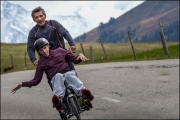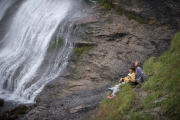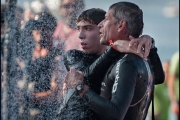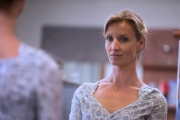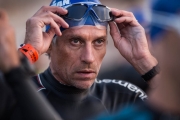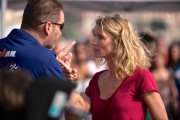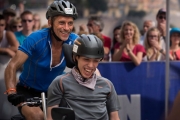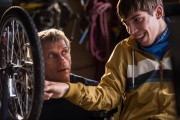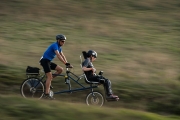![]() Presentation by and discussion with director and co-screenwriter Nils Tavernier
Presentation by and discussion with director and co-screenwriter Nils Tavernier
Like all teenagers, Julien dreams of adventure and thrilling sensations. But when you live in a wheelchair, such dreams are difficult to fulfill. To do so, Julien challenges his father to compete with him in one of the most demanding sporting events. Are they up to it and will they succeed in their self-imposed defying challenge?
Cast & Crew
Director • Nils Tavernier
Screenwriters • Nils Tavernier, Pierre Leyssieux, Laurent Bertoni
Producers • Philip Boeffard, Christophe Rossignon
Starring :
Jacques Gamblin, Fabien Héraud, Alexandra Lamy, Sophie de Furst…
Choose a picture to see the filmography (source : IMDB)
![]()
How did the project come about?
For the past 20 years, I have been very interested in children and sickness, and I had just spent two years at the Necker hospital in Paris in the neurology department working on a documentary. As such, I wanted to address the incredible strength of some of these kids who are different from the rest. I realized that in cases of some particularly serious illnesses, children can have this amazing vital energy that they spread around them, that they spread around to me and that they spread to their own families. I did not want extraordinary characters for my film but I did not want them to be banal either – I wanted people who could be any of us and who reveal themselves to be exceptional thanks to the child in question.
So I wanted to make a film in which the protagonist has a disability, but where we quickly forget the illness- we see how they are different, but as soon as we accept that difference with the energy that comes from it, we no longer see the disability. I think that is wonderful.
Above all, it’s an uplifting film about life…
At the start of the film, the family is paralysed, with a mother who is overinvested in her son – that occurs relatively frequently when one has a special child – and a father who is too often absent. But very quickly, this structure comes apart and the characters reveal themselves to be poetic or funny, and which allows for the return of passion in their life. In the end, the moment of tension is pretty short. The film is funny, moving and full of hope.
One can sense the father’s contained violence. How did you construct the character?
I wanted him to be caught in a vice at the beginning of the film. He goes home reluctantly because he is umployed and he does not want to spend time with his son or wife, and his relationship is about to fall apart. I can relate to him. I sometimes have anger building up inside me that I can contain until it suddenly comes rushing out. For me, the father’s story is one of a modern-day hero, and that is what gives the film its romantic breadth.
The film also deals with the delicate balance between the long absence of the father and the sometimes stifling presence of the mother.
First of all, we are confronted by this mother who smothers her son and a father who is running away from his problems. Then, gradually, their roles as parents are inversed. It is difficult for the mother to accept the father finding his place in their son’s life because, by definition, she is losing some of hers. She sees her child becoming emancipated and participating in a project with his father, which takes away some of her authority. While she is happy for him, she feels a little dispossessed and sidelined. And this is the case for many mothers, including those in families who are not dealing with a disability.
How did the idea of casting Jacques Gamblin and Alexandra Lamy as the parents come about?
Jacques has the right body and age for the character – I did not want a 45-year-old dad – and I remembered how in mademoiselle, I found his intelligence very moving. He has a real toughness in his eyes, but as soon as he smiles, his face lights up. I think he still has a real childlike quality – he has held on to that ability to marvel at things and gets a real pleasure from new discoveries. He is an actor who is sensitive to his fellow actors, which is rather remarkable. I needed a father who could do that.
I thought Alexandra was amazing in the players, in which she had this intimacy and extreme sincerity. One is normally used to seeing her being dazzling, and this was the first time to my knowledge that she played a character that was as much about restraint as she was about truth. That is what inspired me to offer her the role of the mother.
How did Jacques Gamblin train for the role?
Jacques did a lot of training for all three disciplines of the triathlon. We even delivered the bike to his home so he could get used to it: he needed to be able to catch his breath on the shoot. But in the end, he did not need much recovery time after the more sporty takes, which meant we could shoot more scenes than we had planned. Jacques did not want to meet with any sick kids in hospital because he wanted the film to go beyond they handicap. Above all, he wanted to play a father and to work on his relationship with Fabien for whom he felt responsible. And Fabien needed to trust him completely to shoot the scenes where they are both hurtling around bends on mountain roads at 55kph!
Press Kit “De toutes nos forces”
English ~ 9 pages ~ 2 Mo ~ pdf
Press Kit “De toutes nos forces”
French ~ 16 pages ~ 2 Mo ~ pdf



